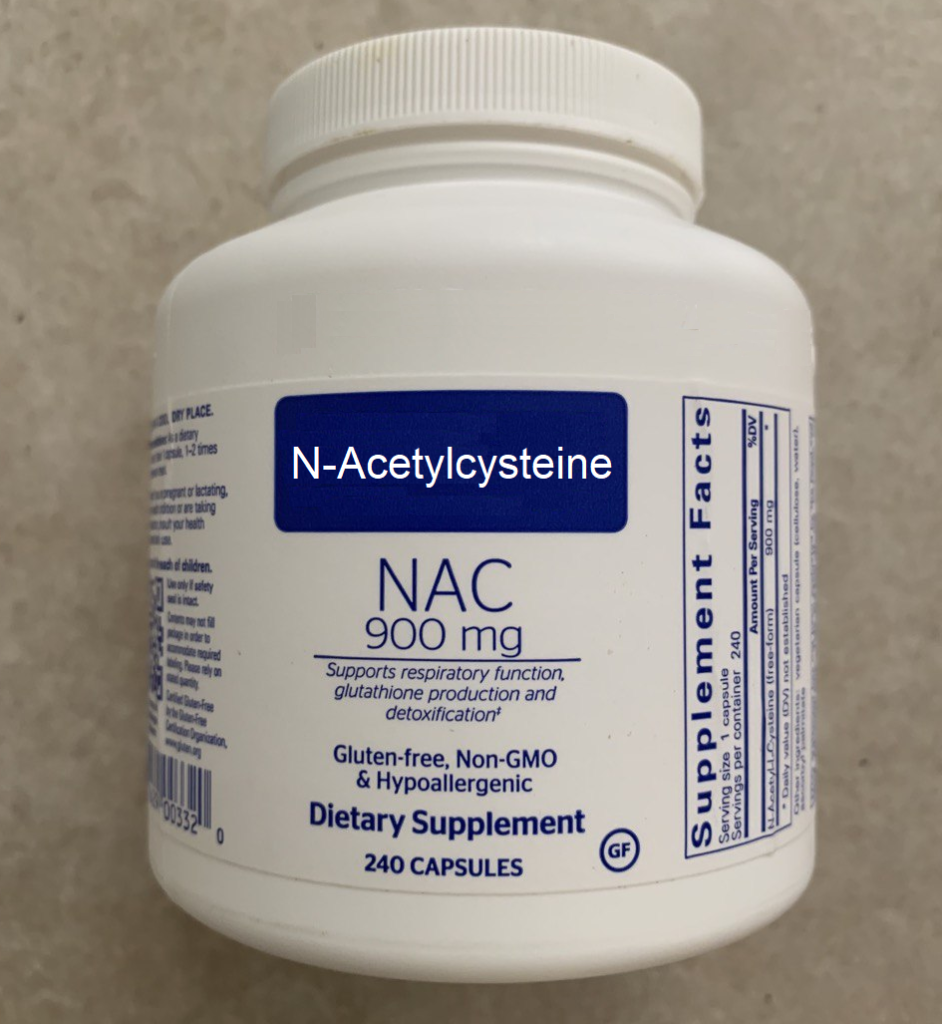N-Acetylcysteine (NAC)
N-acetylcysteine, or NAC for short, is an amino acid with an acetyl group attached. Acetyl groups are derived from acetic acid which is just another name for vinegar. Acetyl groups are usually added by a chemical reaction between acetic acid and a specific substance.

In the body, the amino acid NAC acts as a precursor to glutathione. Glutathione is made from cysteine and acts as one of the body’s main antioxidant defenses. Taking NAC is a simple, but powerful way to increase your antioxidant reserves.
Interestingly, NAC is an approved treatment for liver-toxic doses of tylenol (acetaminophen). If administered quickly enough, it is almost 100% effective against tylenol-induced liver toxicity (Ershad 2021). It works by shoring up the liver’s antioxidant system, reducing the damage from a tylenol overdose.
As of late, research on NAC has been increasing. Treatment with NAC has been found to be potentially helpful for a number of different health conditions, including liver disease, reproductive problems and mental health,
NAC and Liver Disease
Early liver disease is often a silent condition without any symptoms. The most common form, non-alcoholic fatty liver disease (NAFLD) has increased from 391.2 million cases in 1990 to 882.1 million cases in 2017 (Ge 2020). Just over one in ten individuals worldwide has NAFLD. In severe cases, scarring of the liver can lead to liver failure and death. Recent pilot studies suggest that n-acetylcysteine combined with standard blood sugar medication may improve liver function (Oliviera 2019).
Additionally, a recent meta-analysis reviewed the use of NAC in cases of outright liver failure. Seven clinical studies were included. The review found that NAC improves survival before and after liver transplant (Walayat 2021).
NAC and the Male Reproductive System
Low sperm counts in men can contribute to infertility and problems conceiving a child. A recent trial of NAC in infertile men found increased sperm counts and reduced numbers of abnormal sperm. Testosterone levels also improved with NAC (Jannatifar 2019). In a similar study, NAC was also shown to significantly improve sperm quality and increase testosterone (Safarinejad 2009).
NAC and the Female Reproductive System
Polycystic Ovarian Syndrome (PCOS) is the most common endocrine problem in reproductive women. The condition often leads to infertility and has roots in blood sugar dysregulation.
In a trial of women with infertility, standard therapy was combined with NAC. After three months, NAC improved ovulation and pregnancy occurrence. In addition, NAC also helped reduce blood sugar problems (Sharkwy 2019).
Medication is often used in PCOS to try and improve fertility. A head to head comparison trial found that NAC had comparable efficacy to standard medication and could be considered an alternative treatment (Cheraghi 2016). Other trials have also found benefits combining NAC with standard treatments for female infertility related to PCOS (Rizk 2005, Badawy 2007, Salehpour 2012).
NAC and Mental Health
Research for mental health conditions is starting to show that NAC may have a positive impact on mental health. While there is some controversy around the findings, a recent review found that NAC reduces depressive symptoms and improves functionality in depressed patients (Fernandes 2016).
Schizophrenia is a dreaded mental health diagnosis often associated with lifelong challenges. Individuals with schizophrenia have symptoms that include delusions, hallucinations, odd speech patterns and poor motivation. Trials of NAC for schizophrenia typically combine NAC with standard treatment. A recent Russian study found benefits for social interactions, communication and motivation along with improvements in memory (Pyatoykina 2020). Other trials have found similar benefits for treating patients struggling with the condition (Breier 2018, Sepehrmanesh 2018, Farokhnia 2013).
Evidence is preliminary and somewhat mixed, but some trials have also found benefits with NAC for chronic hair pulling in adults (Grant 2009) and attention deficit disorder in patients with the autoimmune condition lupus (Garcia 2013). Trials using NAC for individuals struggling with addiction also suggest improvements in cravings and reductions in relapse (Ooi 2018).
Conclusion
NAC is an interesting treatment, well proven to effectively raise antioxidant defenses throughout the body. A number of different conditions appear to benefit from NAC, including liver disease, infertility in both men and women and a number of different mental health conditions.



